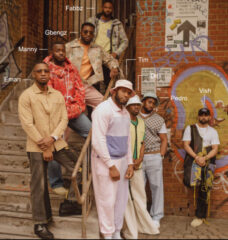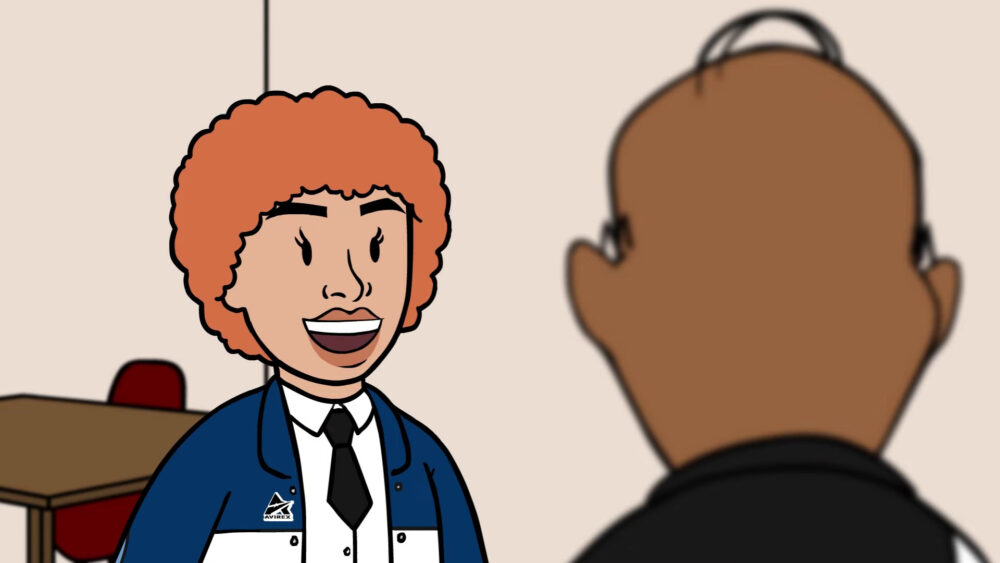What do you get when you combine the freewheeling banter of a group chat, no-holds-barred humor and colorful digital animation? If you’re the nine friends behind Pass The Meerkat, you get a hit webtoon! Created by London-based collective 9ine Degrees (Eman, Tim, Deji, Pedro, Vish, Manny, Gbengz and Fabbz), the 2D series will launch its fifth season on YouTube on Wednesday, August 16.
Pass The Meerkat presents the humorous and relatable stories of nine friends in punchy quarter-hour episodes, immersing audiences in a blend of casual conversation and cutaway skits. In Season 5, the gang covers covering topics ranging from growing up in the hood, relationships, footie and more, with guest appearances from Shxts N Gigs, Axel Blake and Marvin Abbey.
Here’s what the 9ine Degrees crew had to say about their viral toon, which boasts 30 million views across all platforms:

Animation Magazine: Can you tell us a bit about the beginnings of your project?
9ine Degrees: It started with a holiday to Croatia, and naturally because of practicality you create a group chat with the attendees. We had some brilliant times and great conversations on that trip and it sparked an idea that if we could convert this great thing we had into content, it would be enjoyed by other people as much as us on the inside.
So Deji pitched the idea to the boys, and everybody jumped on it. It took us a few months to figure out how to make things work as none of us knew much about the ins and outs of animation. After months of meetings and consultations with a very talented animator we had a teaser, we were ready to put out into the world. It was received well by our immediate audience, which was basically our friends and family through social media. It has the typical modern day success story of good content distributed through social media in going viral but more importantly we had loads of comments on how good the format was. We knew that we had something good on our hands, and we couldn’t wait for the first season to be released.
What were the inspirations?
We are inspired by cartoons in general, and being from the millennial generation that grew up on Cartoon Network and Hanna-Barbera cartoons it is hard not to be. Nostalgia feeds so much into what we do with the animation and the creative directions. It’s like we saw 100 scenes of Looney Tunes shorts where smoke is generated by the feet when people try to run fast. We’re taught that’s the norm in cartoons, so we put that into our product.
However, I would be being dishonest if I failed to mention The Ricky Gervais Show, which set the foundation for what we do. Two of the cast, Deji and Sheikh, were sitting down watching it and this is when the idea of making a “Black spin on The Ricky Gervais Show” was floated. It is such a good concept — like, everybody’s got funny stories, and we loved the way they had a very simplistic idea of a podcast in which they go into hypotheticals or stories that are exaggerated through animation.
Tell us a bit about your team?
The nine of us that went to Croatia together formed the production company called “9ine Degrees.” This was proposed by the business mind of the group, Manny, very soon after we got Pass the Meerkat off the ground. The idea was that PTM would be the first child of this production company. We share responsibility for most things, with various experts leading in their respective areas of expertise.
As for PTM specifically, the team has grown (and then shrunk) over the years. We started out with one animator with a couple assistants, which seems unfathomable now. Now, we have a team of animators who worked quite closely together. Some of them storyboarding, some illustrating and most of them animating. In the past, we’ve had huge teams with junior animators, but scaled back for this season.
The 9ine Degrees guys play a huge part in the animation process too. We are the creative directors — which is a fancy way of saying we dictate what is on screen visually. We are also responsible for the sound edit of the final product. We get together and pick what sounds to put where in the product, and then Deji, who is a sound engineer, creates the sound edit adding in the sound effects and mixing the podcast audio (voice over).
Which animation tools do you use?
Our animators mainly use Adobe Animate alongside After Effects.
How long does it take to produce each episode?
It depends on how many animators we have working simultaneously. I would say at our fastest we are looking at one episode (10-12 minutes long) every three weeks.
What has the reception been like so far?
The reception has been amazing, more than we could have ever hoped for. We came into this with two target markets, one being the general consumer and the other being production companies and commissioners. We have over 30 million views on our product across platforms — but I am mindful that views don’t always mean your product is good. If we had to brag about something it would be the amount of people that actually subscribe or follow the content, the hundreds of thousands of people that have become invested in our series, our stories.
Qualitative feedback is important, too. We get so much positive feedback on the originality of the product, the chemistry of the group, our humor, our storytelling and how polished the product looks. Plus, we have an amazing, engaging and interactive fan base that has a created a community where people feel like they are immersed in the world of Pass The Meerkat.
Our second audience has also shown huge interest in the products and put us in rooms (or Zoom calls) with some of the best production companies and commissioners in the business.
What is your toughest challenge?
I think our biggest challenge has been knowing where we fit in, or other people not knowing where we fit in. It’s weird, because having a product that is so elastic has had such huge benefits but also creates some high hurdles. So, through Pass The Meerkat, our team have become podcasters, content creators, YouTubers, voiceover actors, producers, script writers, storytellers and performers. This brings so many different opportunities but has also meant we haven’t honed specialties or excelled in one particular field.
I would also say that within these fields, animation makes us unique but ostracized because there’s no proven formula. We are creating the formula ourselves and people are rarely willing to take a risk on it as they might do other pieces of content. Animation also presents some practical obstacles as well e.g., turnover time and costing. It’s hard not to think that the best trait of the product is also one of the biggest barriers.
What do you love about your show?
We love being able to tell genuine stories that relate to people all over the world and find the comedy in. We love the creative process of seeing a story come to life when animation is added. And we love the reception we get from people we meet who can recognize characters, recite favorite lines or recall key moments, accompanied by the joy on their faces as they do.
Every creator knows the feeling of bringing something from your brain, writing it down and seeing the final product being appreciated by others. There’s no feeling like that, and it keeps us going! As we’re so in love with the creative process, it’s something we’d keep doing even if it was only us watching the show.
Last but not least, we love the fact that we can do this as a group of friends. Sure, it comes with its own challenges, but the feeling of winning and succeeding with your best friends is one that words can’t describe.
What is your take on the importance of diversity both behind the scene and on screen and do you see the animation climate getting better for POC?
Diversity is crucial in every aspect both on and off screen, and in everyday life. We feel it is an enabler and breeder of creativity with endless limits and most importantly, it shines a light on things which audiences can either resonate with or learn about. Having nine producers and cast members is proof of that, the richness of diversity is what truly makes us and our products truly stand out.
The animation climate is getting better but we still feel there could be more opportunities for POC and specifically for upcoming talent or growing small-to-medium business. In particular, opportunities like partnerships or co-productions are very hard to come but would be instrumental in pushing the industry forward. However, we also have our own part to play, which is why we regularly try to inspire the next generation of producers and animators by doing motivational talks at educational institutions and events.








 Win a Funko X Lilo & Stitch Prize Pack!
Win a Funko X Lilo & Stitch Prize Pack!

